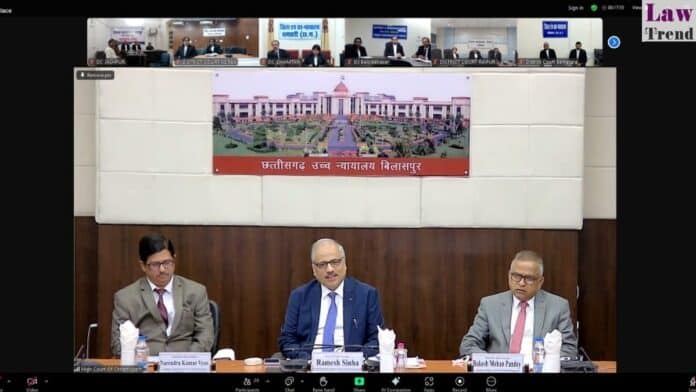A Video Conferencing session was held on 07/02/2025 at 5:00 PM, chaired by the Hon’ble Shri Justice Ramesh Sinha, Chief Justice, High Court of Chhattisgarh. The session focused on crucial judicial infrastructure topics, including E-Waste Management and Digitization in Courts.
In the Conference Hall, Hon’ble Shri Justice Narendra Kumar Vyas (Chairman), Hon’ble Shri Justice Rakesh Mohan Pandey (Member), Hon’ble Shri Justice Ravindra Agrawal (Member), Hon’ble Shri Justice B. D. Guru (Member), along with the Registrar General and other Registry Officers were present. Additionally, Principal District Judges, Family Court Judges, and Chairmen of District Court Computerization Committees from all districts participated via video conferencing.
One of the key agenda points discussed was the proper management of e-waste in courts. Effective disposal and recycling of electronic waste were emphasized as essential measures for maintaining a clean and efficient working environment. The Hon’ble Chief Justice directed all Principal District Judges to implement structured e-waste disposal mechanisms in compliance with prescribed guidelines. Each district must establish a dedicated committee to identify, categorize, and systematically dispose of obsolete electronic equipment. Items that are still functional but no longer needed may be auctioned to court employees in a transparent manner, while the remaining unusable electronic waste should be recorded, listed, and disposed of responsibly. To ensure proper tracking, a shared online record system must be maintained and updated regularly.
Another major point of discussion was the digitization and scanning of judicial records. To modernize judicial administration, courts must allocate specific areas for scanning and digital storage. The process should be overseen by staff members who are assigned secure digital signatures for authentication. The necessary infrastructure, including proper lighting, high-speed internet connectivity, and computer systems, must be arranged to facilitate this transition. Additionally, all pending and completed case records should be systematically indexed and paginated for easy access and retrieval.
To ensure smooth implementation, courts must integrate digital solutions into daily judicial operations. All e-waste categorized as scrap must be collected at district headquarters for disposal under expert supervision. Furthermore, each district must appoint an expert responsible for overseeing the entire process of e-waste management, digitization, and scanning of records. All Principal District Judges were instructed to execute these initiatives efficiently and submit timely progress reports. Through these collective efforts, the judicial system will become more organized, environmentally sustainable, and technologically advanced.
This initiative marks a significant step toward modernization and environmental responsibility in our courts. By embracing digitization and sustainable waste management, the judicial system aims to enhance efficiency, transparency, and long-term sustainability in judicial operations.




